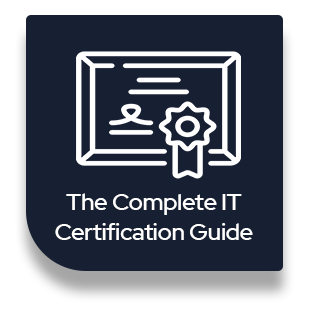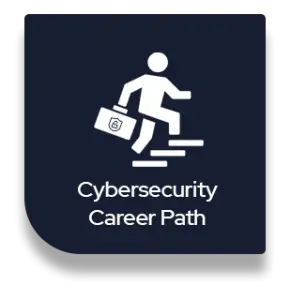A complete guide to IT certifications
The tech industry is rapidly expanding, and the demand for IT skills in the workforce is growing. A career in IT can be rewarding and has longevity. It is essential to stay updated with the ever-changing world of technology by earning certifications. With many options like security, networking, cloud, sys admin, and dev, knowing how to get started or the next step in your certification path can be challenging. Here is the ultimate guide to IT certifications.
Why get certified?
According to CompTIA, 91% of employers say certifications are critical for hiring the right talent and that IT certifications are a reliable predictor of a successful employee.
Getting certified is the best way to launch your IT career, increase your salary, or stay competitive. Certification in IT is a testimony to your knowledge and skill. Employers seek out applicants with certifications, and many give promotions or incentives to their current employees who pass certification exams. So whether you’re just starting out or are a seasoned pro looking to advance in your field, which certification is right for you?
Do I need a bachelor’s degree?
Going through academia can be costly and time-consuming; it is more common in the IT industries to have informal (what about non-traditional training) training. According to the Bureau of Labor Statistics, around 25% of IT workers in the United States do not hold a bachelor’s degree. A degree benefits many IT career paths but is not a necessity. You can still earn big in IT without a degree.
What certifications are needed to get an entry-level job?
- CompTIA IT Fundamentals: If you’re interested in tech but unsure what career path to take, the CompTIA IT Fundamentals+ certification is a great place to start. It serves as a pre-career certification that will determine if you have competency in information technology. The exam covers basic knowledge across all IT fields so you can get a broader understanding of the different careers in IT. This certification will help you learn basic skills in IT concepts and terminology, infrastructure, applications and software, software developments, database fundamentals, and security. After completing this exam, you will better understand what ideas interest you. Skilldacity offers its entire IT Fundamentals+ course for free.
- CompTIA A+: Another certification to kick-start your IT career is CompTIA A+. The A+ will give you a deeper understanding of a broad range of topics, and you will learn more hands-on skills than CompTIA IT Fundamentals+ covers. It is a significant credential for those looking for a technical support or IT operational role.
- CompTIA Security+: The best place to start is a CompTIA Security+ exam if you know you are interested in security. CompTIA Security+ is a vendor-neutral certification that deals with several key concepts in IT security, including networks, data and host security, threats and vulnerabilities, compliance, access and identity control, and cryptography. In addition, this certification demonstrates your basic knowledge of implementing security best practices.
- Cisco CCT Routing and Switching is a good starting certification for someone interested in networking. However, if you want to become a cisco field technician, working hands-on installing and basic configuration, the CCT Routing and Switching certification is for you. The skills are beneficial for the CCNA candidate, but it is more equipment installer-focused and service-focused.
A one-on-one meeting with a Skilldacity Certification Consultant can provide personalized insight on the best steps to achieve your IT career goals.
What is the difference between vendor-specific and vendor-neutral certifications?
Another thing to consider when getting an IT certification is whether the certification is vendor-specific or vendor-neutral. Vendor–specific certifications show expertise in a particular tool created by that vendor. For example, a Microsoft Azure certification shows a knowledge base of that specific cloud computing platform and services. A vendor-neutral certification shows a broader understanding and skill base of technologies and products that are universally applicable.
Vendor-neutral certifications include:
- Computing Technology Industry Association, CompTIA
- Global Information Assurance Certification, GIAC
- The International Information System Security Certification Consortium (ISC)²
- International Council of E-Commerce Consultants, EC-Council
- Information Technology Infrastructure Library, ITIL
- Project Management Institute, PMI
- Information Systems Audit and Control Association, ISACA
What does the process of getting IT certified look like?
So, you’ve decided what certification you want to obtain. Next, it’s time to get down to work. To pass the exam, you will require some training. You can get your IT training in a classroom environment or through an online training site. Online training is typically more affordable and allows you to move at your own pace. After studying the exam objectives, you can book a time and place to take your certification exam. After taking and passing your exam, the certification vendor will send you a certificate of completion. Finally, don’t forget to celebrate your success by posting your certification to your LinkedIn resume or online study group!
Where can I get training for my IT certification exam?
Training for IT certifications is available online or in a classroom. Online IT training is a more affordable way to receive quality training anytime.
What is accredited v. non–accredited training?
Accredited training means the certification vendor has reviewed and approved the course materials. Non-accredited training has yet to be validated by the certification vendor.
What should I know before taking my IT certification exam?
Are there any changes coming to that certification?
Ensure that the certification you wish to earn has stayed the same. Vendors can retire exams or create new certification pathways. Microsoft certifications, in particular, are ones to be cautious of because of Microsoft’s history of retiring exams just months after rolling them out.
Are there any prerequisites to getting certified?
When going for a higher-level certification, there is often a recommendation or sometimes requirement for other certifications before you can obtain the next level. For example, getting a CompTIA Security+ certification is recommended before sitting the CompTIA Advanced Security Practitioner CASP+ exam. In addition, some certifications require a particular amount of classroom or on-the-job training. For example, Certified Information Systems Security Professional CISSP candidates must have at least five years of cumulative paid work experience in two or more of the eight domains of CISSP CBK.
How do I prepare for my IT certification exam?
Set a date
Don’t let procrastination get the best of you; set a date to take the exam. Setting a deadline for yourself will help you be more accountable for your study time and keep you on track to getting certified.
Review the exam objectives.
The course vendor’s website will have a list of objectives to learn for the exam. These are the main focus of the course material, and you should expect all objectives to appear on the exam. Use these as a study guide to ensure you know the material listed in all the objectives.
Practice, practice, practice
Taking practice exams and practicing in a lab environment is a great way to prepare for your exam and test your skills. These labs allow you to test commands and spin up servers with no risk. These can be crucial for those who learn best with hands-on training.
Join a community
Find others who are preparing for the same exam as you or have already gotten certified. You may find local groups or online communities such as forums, wikis, Facebook Groups, or websites that allow you to collaborate and share knowledge with others. Engaging in communities can help you learn from others’ mistakes or ask questions about topics you have difficulty understanding.
Rest
It’s final exam day, and your nerves are on edge. Try to relax and set yourself up for success by arriving at your exam testing location early and double-checking that you bring all the required documentation.
How much does an IT certification exam voucher cost?
The pricing of exam vouchers varies. The most expensive exam is the Cisco CCAr Board Exam which costs $15,000. However, the price of that exam far exceeds most. Exam voucher prices typically vary between $150 to $1,000. It’s important to remember that the cost of an exam is an investment in your future that will likely increase your salary.
How do I schedule my IT certification exam?
Most exams are taken in person at a certified testing center. However, many vendors are starting to allow proctored exams you can take online. You must visit the certification vendor’s website to schedule your exam to purchase an exam voucher. From there, the vendor will guide you through planning a date and time to take the exam. Vendors have specified testing delivery partners. You can find the closest test-taking center through the testing vendor’s website and schedule a time to take your test.
How long will it take me to get IT certified?
The pacing of obtaining a certification is dependent on you. Training for and earning your certification could take a few weeks to months, depending on your prior knowledge of the course material. To avoid procrastination and burnout, you should set a deadline by selecting a date for your exam from the beginning. For most exams, we recommend taking around three to six months to study and take your certification exam.
What are the highest-paying IT certifications in 2023?
The 15 top-paying certifications are :
- Google Certified Professional Cloud Architect — $175,76
- AWS Certified Solutions Architect – Associate — $149,44
- CISM – Certified Information Security Manager — $148,62
- CRISC – Certified in Risk and Information Systems Control — $146,480
- PMP – Project Management Professional — $143,493
- CISSP – Certified Information Systems Security Professional — $141,452
- CISA – Certified Information Systems Auditor — $132,278
- AWS Certified Cloud Practitioner — $131,465
- VCP-DCV: VMware Certified Professional 6 – Data Center Virtualization — $130,226
- ITIL Foundation — $129,402
- Microsoft Certified: Azure Fundamentals — $126,653
- Microsoft Certified: Azure Administrator Associate — $125,993
- CCA-N: Citrix Certified Associate – Networking — $125,264
- CCNP Routing and Switching — $119,178
- CCP-V: Citrix Certified Professional – Virtualization — $117,069
Technology jobs that have an average salary in the 6-digit range include:
- Big data engineer
- Data security
- Data scientist
- Network security engineer
- Database developer
- Software engineer
- Network security administrator
- Network Engineer
- Software Developer
- Web designer
Which IT certifications will increase my salary?
Earning a highly sought-after certification, such as a security-focused cert, could make your skills more valuable to an employer or open the door for new opportunities. For example, suppose you’ve earned your Cisco CCNET cert and want to increase your salary. In that case, you may consider Cisco CCNA Security as your next step; check out this blog for more security certifications to boost your salary.
What IT certifications do I need for Government jobs?
To get IT training for Government jobs, you need the training to comply with the Department of Defense (DoD) requirements. The requirements created by the DoD are known as Information Assurance Workforce Improvement Program, an umbrella term for two categories: Information Assurance Technical (IAT) and Information Assurance Management (IAM). The IAT and IAM are guidelines for the training, certification, and management of all government employees. Check out this list of DoDD–approved 8140 (or DoDD 8570) baseline certifications. (link)
Do IT certifications expire?
Expirations on certifications depend on the vendor. Many vendors, such as VMware and Microsoft, adjust to make certifications good for life. But, at the same time, some expire after just two years of getting certified. For example, your Cisco CCIE certification expires after two years. It requires you to re-certify to keep an active CCIE status.
How do I re-certify after my IT certification expires?
It’s essential to keep your IT certifications active to show your current or potential employers that you are dedicated to maintaining your skillset and are up to date on existing technologies.
The recertification process varies across vendors. Check out this blog for a breakdown of recertification for the most popular certifications.
For CompTIA, each certification requires a certain number of Continuing Education Units or CEUs. CEUs are activities that show you are staying current with the skills needed for your certification. These activities include teaching, earning or requalifying for a non-CompTIA industry certification, or gaining work experience.
Some vendors require you to take an exam to re-certify. For example, AWS requires you to take the Cloud Practitioner Exam to re-certify or pass any Associate-level or Professional-level certification.
Best of luck with preparing for your certification exam! If you want binge-worthy learning for your IT certification exam, check out Skilldacity’s course library, with over 4000+ hours of online video courses for IT professionals.



